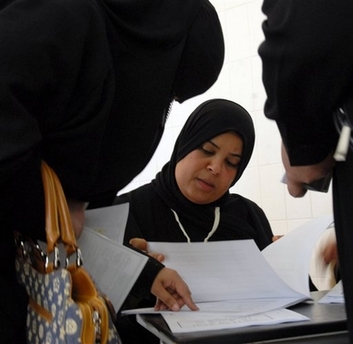Asia-Pacific
Women vote in Kuwait for the first time
(AP)
Updated: 2006-06-29 20:16
 |
Large Medium Small |
Women in this conservative oil-rich emirate voted in parliamentary elections for the first time Thursday, a vote that also inspired surprisingly vocal calls for reform and criticism of the ruling family.
 A Kuwaiti woman voter, left, looks for her name in the ballot's list at a polling station in Salwa, Kuwait City on Thursday, June 29, 2006 during the country's parliamentary elections, the first to include women. [AP] |
The polls marked a new stage in the U.S. ally's tentative moves toward greater democracy -- and not just because of the entry of women. The election brought unprecedented political activism in a country where the ruling family has strong influence over politics, with conservative Islamists joining liberals in demanding electoral reform and protesting corruption.
Women, who won the right to vote and run for office last year, went to separate polling stations from men, choosing among 252 candidates competing for 50 parliamentary seats. Twenty-eight candidates were women.
"Before, election day did not mean anything to us," said Gizlan Dashti, 22, a university student wearing jeans and a red headscarf. "Now, women have a say."
With women making up 57 percent of Kuwait's electorate of 340,000, even fundamentalist Muslims who opposed giving them the right to vote have campaigned for their support.
Candidate representatives waited for women at a polling station in the wealthy Dahyia area, carrying umbrellas to shade them from the scorching sun as they walked from their chauffeured cars to the building. They also presented them with roses and cards bearing the name of their candidate.
Inside the school, four lines of women formed in the first hour of the vote, an indication that turnout might be heavy.
Women had their first chance to run and vote for public office in April after a Municipal Council seat became vacant. Turnout was lower than expected, but one of the two females candidates finished second to the tribal nominee, and more men than women voted for her.